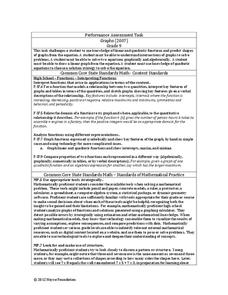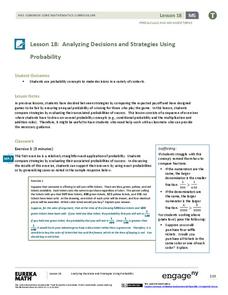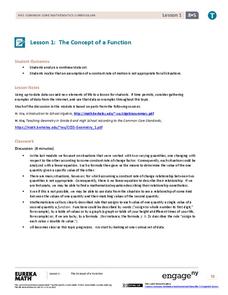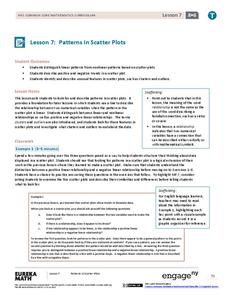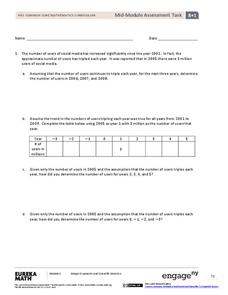Scholastic
Study Jams! Volume
Young mathematicians may solve for cubic units but do they know what that is? This video does a great job of visually explaining not only how to find cubic volume, but what it means in relatable terms.
Inside Mathematics
Graphs (2007)
Challenge the class to utilize their knowledge of linear and quadratic functions to determine the intersection of the parent quadratic graph and linear proportional graphs. Using the pattern for the solutions, individuals develop a...
Balanced Assessment
A Loud Noise
In a scale measuring noise, an increase in 10 dB is a 10 time increase in power. Mathematicians examine the data graph of a real world exponential growth, with no logarithmic scale, and then create two equations relating the...
EngageNY
Expected Value of a Discrete Random Variable
Discover how to calculate the expected value of a random variable. In the seventh installment of a 21-part module, young mathematicians develop the formula for expected value. They connect this concept the dot product of vectors.
EngageNY
Determining Discrete Probability Distributions 1
Learn how to determine a probability distribution. In the ninth installment of a 21-part module, future mathematicians use theoretical probabilities to develop probability distributions for a random variable. They then use these...
EngageNY
Estimating Probability Distributions Empirically 2
Develop probability distributions from simulations. Young mathematicians use simulations to collect data. They use the data to draw graphs of probability distributions for the random variable in question.
Balanced Assessment
Red Dots, Blue Dots
Count the connections between dots. Young mathematicians come up with a method to determine the number of connections between pairs of dots. The assessment leads the class to determine the connections they can make when groups are...
EngageNY
Games of Chance and Expected Value 2
Use expected values to analyze games of chance. The 15th installment of a 21-part module has young mathematicians looking at different games involving tickets and deciding which would be the best to play. They calculate expected payoffs...
EngageNY
Analyzing Decisions and Strategies Using Probability 1
Learn how to increase the probability of success. The 19th installment of a 21-part module teaches future mathematicians how to use probability to analyze decisions. They determine strategies to maximize the chances of a desired outcome.
Balanced Assessment
Chameleon Color
Don't let the resource hide from you. In the assessment task, young mathematicians solve problems involving chameleons that change color. Three different problems require individuals to apply parity in various situations.
EngageNY
The Concept of a Function
Explore functions with non-constant rates of change. The first installment of a 12-part module teaches young mathematicians about the concept of a function. They investigate instances where functions do not have a constant rate of change.
EngageNY
Linear Functions and Proportionality
Connect linear equations, proportionality, and constant rates of change to linear functions. Young mathematicians learn how linear equations of the form y = mx + b can represent linear functions. They then explore examples of linear...
Balanced Assessment
Function or Not?
Is it possible for an equation to be a function and not a function at the same time? By completing a short assessment, young mathematicians answer this question. Class members provide an explanation on how an equation represents a...
Yummy Math
Deflate-gate
Does temperature affect the air pressure of a football? Young mathematicians look at the readings from a pressure gauge and determine if the balls are within regulation or are under inflated.
EngageNY
First Consequences of FTS
Challenge the young mathematicians to find the exact coordinates of a dilated point. The fifth segment in a 16-part series introduces the class to the converse of the Fundamental Theorem of Similarity. Scholars use the theorem to...
Balanced Assessment
Disc-Ness
Transform your scholars into mathematicians as they develop their own geometric definition. The task asks individuals to compare cylindrical objects and create a definition for the disc-ness of each object. They may use any method and...
Balanced Assessment
L to Scale
Explore the meaning of scale in relation to actual size through this activity. Young mathematicians examine scale models and determine their relationship to each other. They also find perimeter and area of each model.
EngageNY
Patterns in Scatter Plots
Class members investigate relationships between two variables in the seventh installment of a 16-part module that teaches scholars how to find and describe patterns in scatter plots. Young mathematicians consider linear/nonlinear...
EngageNY
Mid-Module Assessment Task: Grade 8 Module 1
Assess your young mathematicians' knowledge and understanding of the properties of exponents. The questions in the seventh lesson of 15 incorporate the properties learned in the first six modules of this series. Individuals use and apply...
EngageNY
Scientific Notation
Young mathematicians learn how scientific notation is meant to save time. Part 10, out of a series of 15, asks scholars to recognize the correct use of scientific notation and finish by adding and subtracting numbers using...
EngageNY
Examples of Functions from Geometry
Connect functions to geometry. In the ninth installment of a 12-part module, young mathematicians create functions by investigating situations in geometry. They look at both area and volume of figures to complete a well-rounded lesson.
Common Core Sheets
Comparing Visual Fractions
Introduce comparing fractions with a worksheet containing visual models. Young mathematicians must first identify the part being described in each model and then write greater than, less than, or equal to. Learners prepare to compare...
Common Core Sheets
Comparing Fraction Relative Size
Which is the larger amount? Two-fourths of 10 dollars, or one-fourth of 100 dollars? This type of question is the main focus of a worksheet that has learners comparing fractions by their relative size. Each problem contains...
Common Core Sheets
Comparing Numerical Fractions (Same Numerator or Denominator)
Compare two fractions with like denominators or like numerators in an excellent skills practice worksheet. With 10 sets of worksheets, the packet uses numbers and visual models to help young mathematicians determine greater...
Other popular searches
- Famous Mathematicians
- Great Mathematicians
- 5 Great Mathematicians
- Female Mathematicians
- Projects on Mathematicians
- Five Great Mathematicians
- The Great Mathematicians
- Mathematicians Fibonacci
- List of Great Mathematicians
- Hall of Great Mathematicians
- Whorls Famous Mathematicians
- The Old Grete Mathematicians

